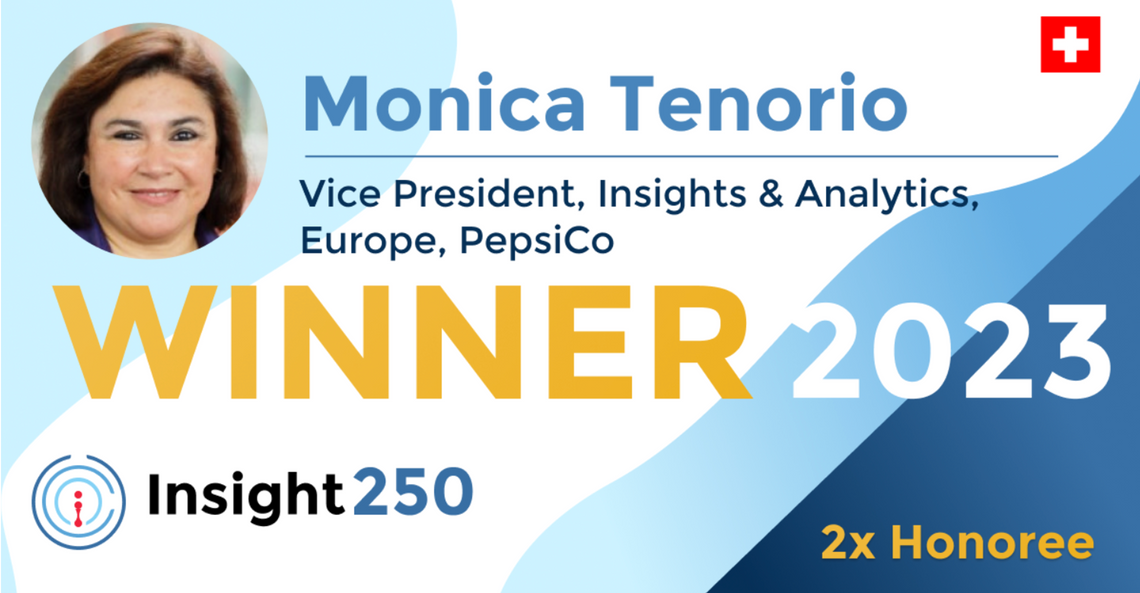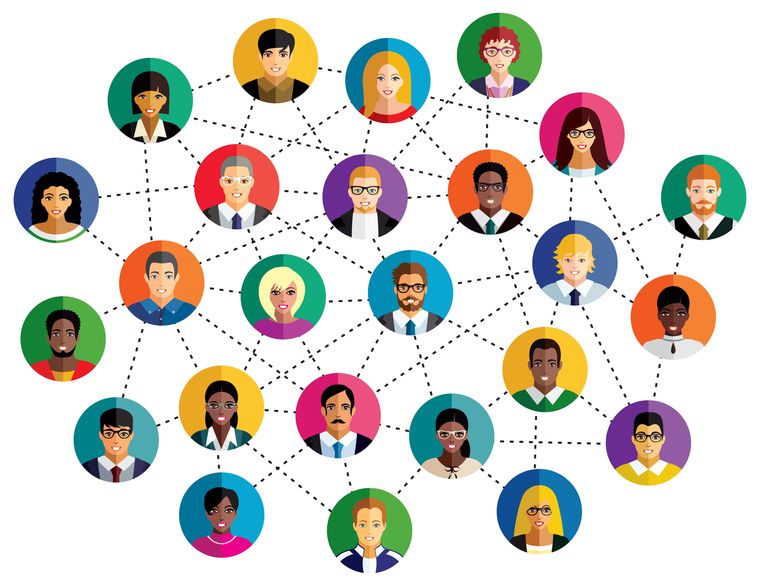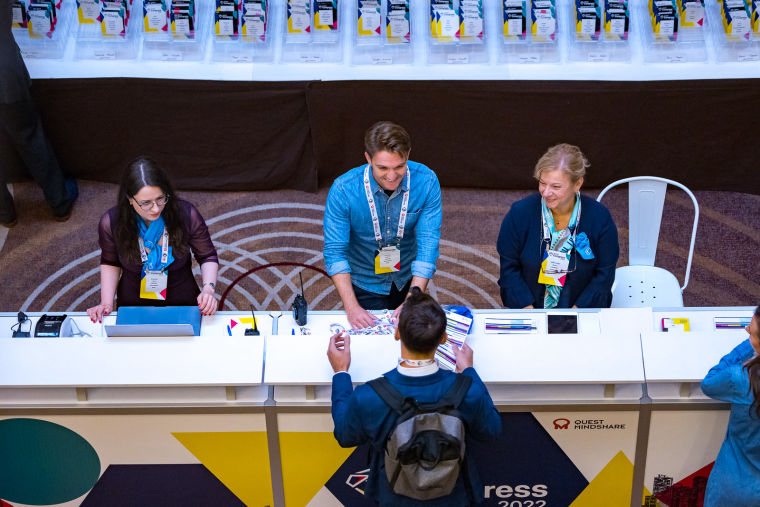The Evolution of Insights in the Food & Beverage Market
Monica discusses her perspective on how research and insights impact the consumer packaged goods industry with both products and consumers and specifically how market research is evolving to help food and beverage brands align with the needs of consumers.

Article series
Insight250
- The importance of business sense in research
- The role of humour in effective leadership
- The importance of ethics
- The importance of disruption in innovation and leadership
- The importance of Disruption in Innovation and Leadership Part 2
- The importance of Diversity & Inclusion
- The impact of colour
- Communicating insight with impact
- Insights on leadership, culture and polling
- The evolution of electric vehicles
- 2022 Top tips (part 1)
- 2022 Top tips (part 2)
- Maximising the potential of data
- The importance of flexible working
- Winners
- The importance of advanced analytics
- Judges for the 2022 Insight250 Awards announced
- The evolution from social listening to digital intelligence
- The Judges' Perspective
- The judge's perspective - part 2
- Insight Climate Collective
- Insights technology
- Understanding employee ownership
- Global insight perspectives
- Top Tips from our Leaders and Innovators
- The Evolution of Insights in the Food & Beverage Market
- The Evolution of Insights in CPG
- Neural Mechanisms Behind Consumer Decision-Making
- Celebrating and Elevating the Insights Industry
- The State of the Insights Industry
- Opportunities, challenges and threats that AI presents
- 2024 Insight250 Winners Announcement
- Connecting Brands and Consumers Through Insights
- The Importance of Human Insight and Attention
- The Elevating Role of Insights with Technology Innovation
- Haleon’s Insight Expert on Consumer Healthcare
- Insight from the Insight250: How AI is Impacting Qualitative Research
- How AI Tech is Doing the ‘Heavy Lifting’ for Insights
- Reviewing the top tips for 2025
- Google's Sarah Ashley on AI and revolutionising insights - Insights from the Insight250
- Beyond BI: The Future of Decision Intelligence for Insight Professionals
- The Advancement & Impact of Insights - An Insight250 Winners Series perspective with David Smith
- International Jury for the 2025 Insight250 Awards Announced
- Newly elected President, Anne-Sophie, on Revolutionizing the Impact of Insights
- Haleon's Litthya Baez on Enhancing Healthcare with Insights - Insight250 Winners Series
- Understanding the Insights of Consumer Decisions
- Moving Beyond Dashboards to Deliver Decisions with AI
- How AI is Transforming Insights
- How AI is Transforming Insights
- Five Years of Insight250: Elevating the Insight Industry
This edition features Monica Tenorio, Vice President of Insights, Analytics & Marketing Capabilities for Europe at PepsiCo. Monica discusses her perspective on how research and insights impact the consumer packaged goods industry with both products and consumers and specifically how market research is evolving to help food and beverage brands align with the needs of consumers.
Crispin: How critical is customer insight for global food and beverage brands like PepsiCo in today’s market?
MT: “For Pepsico, it is absolutely critical. As a global organization, it is really important for us to understand people’s needs, wants, and beliefs around the world so we can deliver brands, products and experiences that meet and exceed their needs. One of our core values across every single function is to be consumer-centric and ensure that everything we do brings smiles to people. Our vision is to deliver smiles with every sip and every bite, so having the right consumer/customer insights is critical. Additionally, under the current environment of change and uncertainty in the world, where people are continuously changing their behavior to adjust to the many different changes and challenges. Understanding and anticipating these changes is fundamental to design strategies and make the right decisions for Pepsico.”
Crispin: Is using insights to drive commercial decisions increasing or decreasing in the sector, and why do you think that is happening?
MT: “The food and beverage sector is clearly seeing an increase in using insights to drive commercial decisions. It has become imperative to understand the impact that the external environment is creating in people’s lives and how this impact is evolving over time. As we all know, COVID created a significant shift in the world and exacerbated the amount and flux in the social, technological, economic, environmental and political macro-forces. It therefore requires the industry not only to understand the impact they create but also for us manufacturers to create a level of foresight that can help us anticipate the impacts and proactively respond to these changes across the entire organization, whether it is for the marketing, commercial sales or finance areas.”
Crispin: What data types are used to develop insights for food and beverage brands and products?
MT: “We use all data types. If anything, an organization the size of Pepsico, does not lack data. We use data to understand our performance today: business analytics, execution assessment, brand performance, creative effectiveness, ROI, etc. We also use data to understand consumer demand and the evolution of it. We leverage predictive tools to help us better understand and anticipate trends and changes in consumer landscapes and demand. But in addition to all of these, it remains critical to balance it all with empathy, and therefore most of the time, we create our insights by connecting the dots between the what and the why between data and empathy.”
Crispin: Does increased competition and a changing customer base influence how food and beverage brands gather insights?
MT: “It does. I firmly believe that organizations that are truly consumer/customer-centric are the winners, and I am seeing other companies in the Industry becoming more innovative in their insight practices. Our retail partners are really stepping up their understanding because they have a direct connection with consumers/shoppers and therefore are in possession of very rich data. I also see smaller/agile organizations that move really fast, which puts a lot of pressure on organizations like ours. Therefore it becomes really important to stay ahead of the game, become more innovative in our insights practices, build data that is more granular/always-on, and invest in technology, like AI, to help us to leverage the data and on the critical areas.”
Crispin: Has the profile of PepsiCo’s customers evolved over the last decade, and what factors do you believe are driving these changes?
MT: “Well, it will be presumptuous of me to talk about the Pepsico consumer from 10 years ago. I have been in the company for the last six years, but I can clearly see changes and an evolution over these last six years. COVID was a defining and defining event that changed in many ways how the world operates and also how people behave. I can see a clear evolution in people’s preferences influenced by the different macro-forces. For example, the attitude to health and sustainable products has changed dramatically, people are becoming more focused on their own personal health and more concerned about playing their role in making the world a better place. At Pepsico, we need to think about how to best deliver to these fast-changing needs. Additionally, the shopping preferences of shoppers have changed, with significant growth on channels like e-commerce and Discounters… we need to ensure we really stay on top of these changes.”
Crispin: What are the key differentiating factors for understanding your customers: frequency of use, demographics (gender, age, ethnicity), geographies (US vs. Europe), etc.?
MT: “I personally believe that consumers are far more similar than different, but having said this, we need to de-average them to understand more deeply how their food preferences, the impact of weather, countries’ retail structures and geographical differences can help us to understand them in a much granular way. We also de-average them by cohort (age, socioeconomic levels, family composition, etc.) where ethnicity plays a growing role. Particularly in Europe, we have a significant part of the population of immigrants with different taste preferences and different food cultures, similar to the Latino population in the US, we have a vast diversity of different ethnicities across Europe.”
Crispin: What role do insights play in attracting new customers and moving them from occasional customers to regular users and even brand advocates?
MT: “In the food and drinks categories, consumers have a repertoire of brands that they use to satisfy a particular need on a given occasion. We have a wide variety of people who enter and leave our brands on a daily basis. What insights have told us is that by making sure our brands are mentally and physically present in the key moments of truth, we have a higher chance for our brands to be selected for a particular occasion if it deliver to the need, We consistently focus our insights to ensure we clearly understand each occasion, for what particular needs and for which person this is should be addressed, so our brands can deliver the right products and create the right engagement with the consumer. And we also play a key role in insights to ensure we identify universal human truths that our brands can leverage to define what our brands stand for so they can create a meaningful connection with consumers.”
Crispin: Can you provide an example of a key insight that fundamentally changed a product decision or marketing strategy at PepsiCo? How do you ensure such insights are effectively communicated and implemented across various departments?
MT: “A recent example that I can provide is Doritos noise cancellation in Spain. As you probably know, there is a wide base of consumers who are gamers, and Doritos is a partner supporting this activity. The team in Spain embarked as a cross-functional team inclusive of marketing, insights, commercialization, IT, etc. that had the objective to better understand how Doritos could become more relevant for the gamers cohort.
“After some research and deep empathy work, they discovered that gamers love to snack while playing, but Doritos was not a brand of choice because when they had Doritos, the crunch at biting the product was so loud, that they could not hear the sounds of the game or even hear the voices of their friends which was very annoying for them. So, based on this understanding and insight, the team was able to develop, in partnership with a tech company, software that could “noise cancel” the sound of the Doritos crunch while playing, which made it possible for the gamers to play and eat Doritos without any disruption - brilliant!
“Doritos noise cancellation is now expanding across the world. The right functions of the organization must be involved in insights generation initiatives, so they not only can contribute during the process, but they clearly understand the insight and what is needed to activate it.”
HOT TOPIC: Market evolution - how do you see the food and beverage insights space evolving?
MT: “As the world and consumers evolve, the food and beverages industry evolves too and adjusts to these changes, as per my previous comments. The importance of the changes in society, the environment, health, etc. creates a very different perspective on how the brands should show up in solving people’s tensions and addressing relevant needs. As a business, we need to ensure our practices are also oriented to improve the sustainability of our planet and people. Pep+ is at the core of our Pepsico strategy and defines the role that Pepsico needs to play a role to provide positive choices for people, a positive value chain and positive agriculture by regenerative practices.”
TOP TIP - What's your top tip to be a leader & innovator in our profession?
MT: “You need to have big dreams, everything is possible, and your teams and partners should believe so too.”
Crispin: Thank you, Monica, for this insightful perspective on how insights are evolving to elevate the food and beverage industry. It’s fantastic to view the industry through your expert lens, particularly with how data-driven understanding and insight innovation are impacting the industry.
Thank you for your time and expertise.

Crispin Beale
Chairman at QuMind, CEO at Insight250, Senior Strategic Advisor at mTab, CEO at IDXCrispin Beale is a marketing, data and customer experience expert. Crispin spent over a decade on the Executive Management Board of Chime Communications as Group CEO of leading brands such as Opinion Leader, Brand Democracy, Facts International and Watermelon. Prior to this Crispin held senior marketing and insight roles at BT, Royal Mail Group and Dixons. Crispin originally qualified as a chartered accountant and moved into management consultancy with Coopers & Lybrand (PwC). Crispin has been a Board Director (and Chairman) of the MRS for nearly 20 years and UK ESOMAR Representative for c15 years. As well as being CEO of Insight250, Crispin is currently Worldwide CEO of Digital Communications Solution Agency, IDX. Crispin is also the Senior Strategic Advisor at mTab and the Chairman of QuMind and spent 4 years as Group President of Behaviorally where he was responsibile for the client & commercial teams globally. Crispin is a passionate advocate for blending human intelligence and technology to deliver innovation and leadership across organisations.
Article series
Insight250
- The importance of business sense in research
- The role of humour in effective leadership
- The importance of ethics
- The importance of disruption in innovation and leadership
- The importance of Disruption in Innovation and Leadership Part 2
- The importance of Diversity & Inclusion
- The impact of colour
- Communicating insight with impact
- Insights on leadership, culture and polling
- The evolution of electric vehicles
- 2022 Top tips (part 1)
- 2022 Top tips (part 2)
- Maximising the potential of data
- The importance of flexible working
- Winners
- The importance of advanced analytics
- Judges for the 2022 Insight250 Awards announced
- The evolution from social listening to digital intelligence
- The Judges' Perspective
- The judge's perspective - part 2
- Insight Climate Collective
- Insights technology
- Understanding employee ownership
- Global insight perspectives
- Top Tips from our Leaders and Innovators
- The Evolution of Insights in the Food & Beverage Market
- The Evolution of Insights in CPG
- Neural Mechanisms Behind Consumer Decision-Making
- Celebrating and Elevating the Insights Industry
- The State of the Insights Industry
- Opportunities, challenges and threats that AI presents
- 2024 Insight250 Winners Announcement
- Connecting Brands and Consumers Through Insights
- The Importance of Human Insight and Attention
- The Elevating Role of Insights with Technology Innovation
- Haleon’s Insight Expert on Consumer Healthcare
- Insight from the Insight250: How AI is Impacting Qualitative Research
- How AI Tech is Doing the ‘Heavy Lifting’ for Insights
- Reviewing the top tips for 2025
- Google's Sarah Ashley on AI and revolutionising insights - Insights from the Insight250
- Beyond BI: The Future of Decision Intelligence for Insight Professionals
- The Advancement & Impact of Insights - An Insight250 Winners Series perspective with David Smith
- International Jury for the 2025 Insight250 Awards Announced
- Newly elected President, Anne-Sophie, on Revolutionizing the Impact of Insights
- Haleon's Litthya Baez on Enhancing Healthcare with Insights - Insight250 Winners Series
- Understanding the Insights of Consumer Decisions
- Moving Beyond Dashboards to Deliver Decisions with AI
- How AI is Transforming Insights
- How AI is Transforming Insights
- Five Years of Insight250: Elevating the Insight Industry


